What is the Youth Champions Program?
The Youth Champions Program (YCP), in partnership with small and medium organizations (SMOs) across Canada, is a program implemented by Spur Change that facilitates knowledge exchange, public engagement and collaboration among Canadian and international youth. The program aims to enhance the capacities and contributions of these youth and SMOs in public engagement on global issues, particularly gender equality and the Sustainable Development Goals (SDGs). Through skills training, support, peer-to-peer learning, tailored subject matter, and mentorship, the YCP aims to increase the capacity of youth across the world to plan and implement public engagement activities that engage young Canadians as global citizens.
Each year, the program has been implemented in four phases.
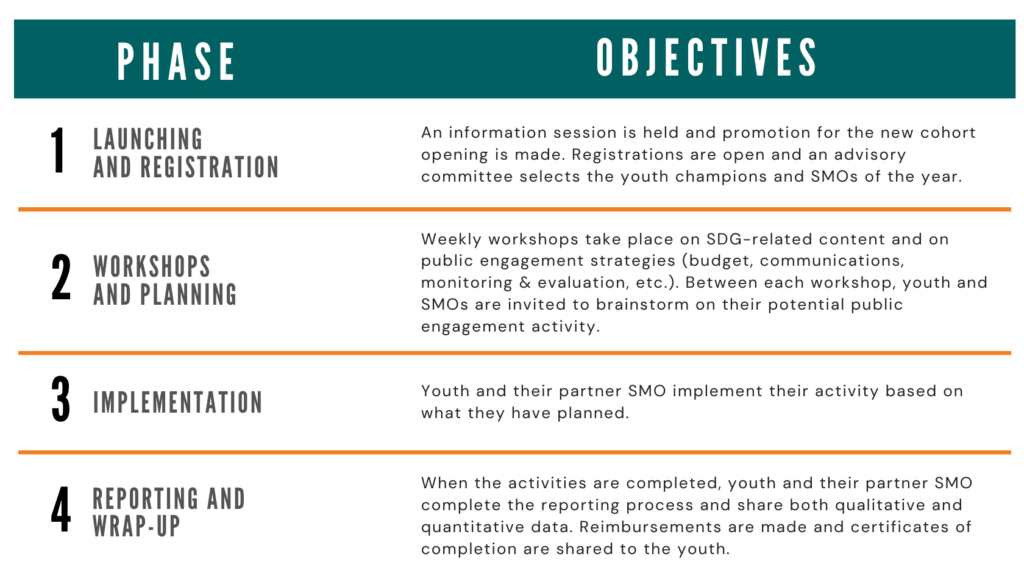
Cohort 4 Results
The Youth Champions Program has reached its final year in 2023. This final cohort featured 15 exceptional youths based in Canada and abroad. These participants brought diverse backgrounds, life experiences, expertise, and interests, resulting in a highly successful program with far-reaching impacts. Read more about each of them here
This year’s cohort implemented public engagement activities that covered a wide range of themes and spanned numerous SDGs. This diverse array of public engagement initiatives showcased the creativity, dedication, and passion of the participants, leaving a remarkable impact on both local and global communities. View an overview of their results in the visuals below.
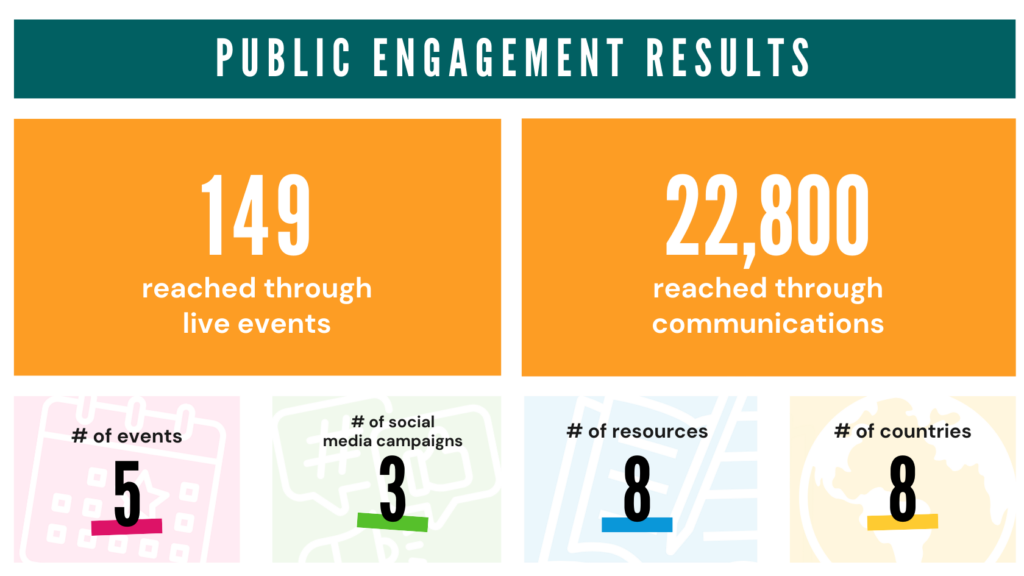
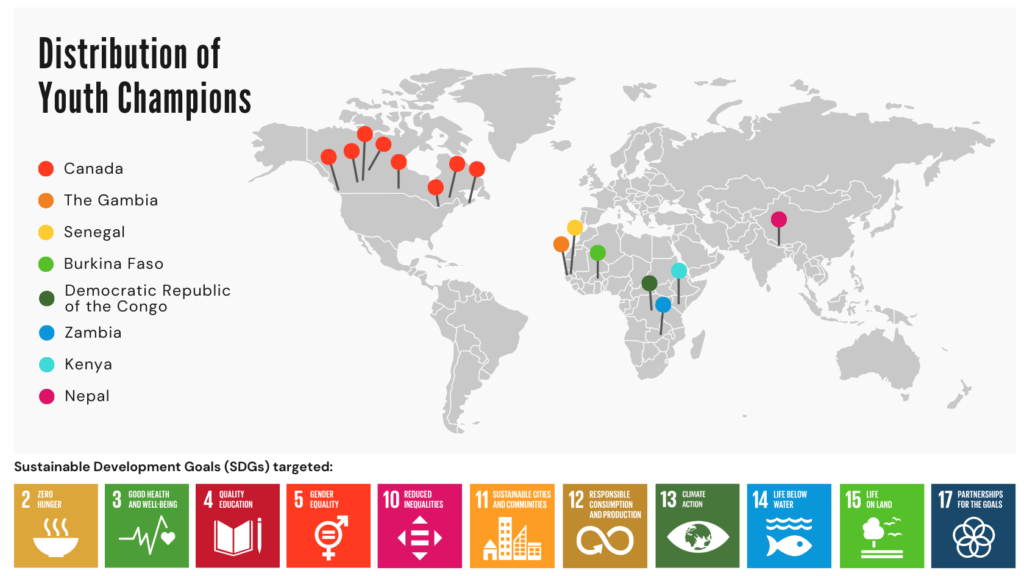
Clarification of the map above: the 15 Youth Champions from this cohort joined from Canada (British Columbia, Alberta, Manitoba, Ontario, Quebec, and Nova Scotia), The Gambia, Senegal, Burkina Faso, the Democratic Republic of Congo, Zambia, Kenya, and Nepal).
Youth Champion Testimonials
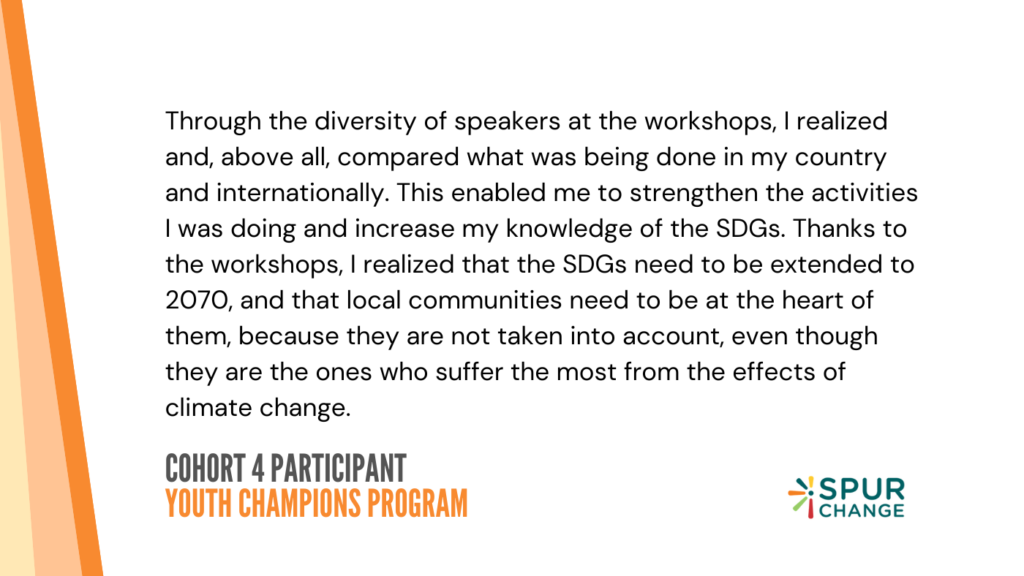
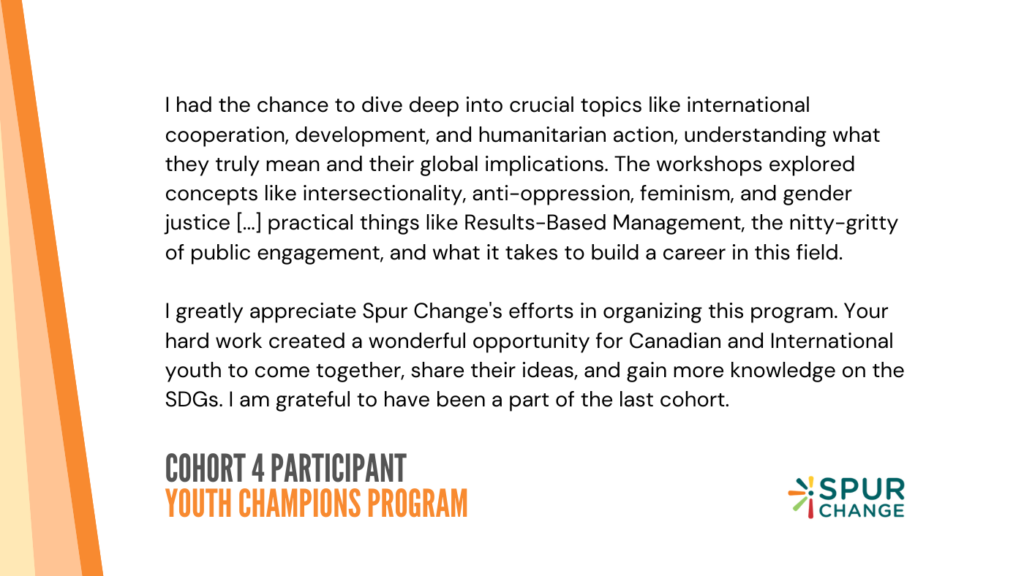
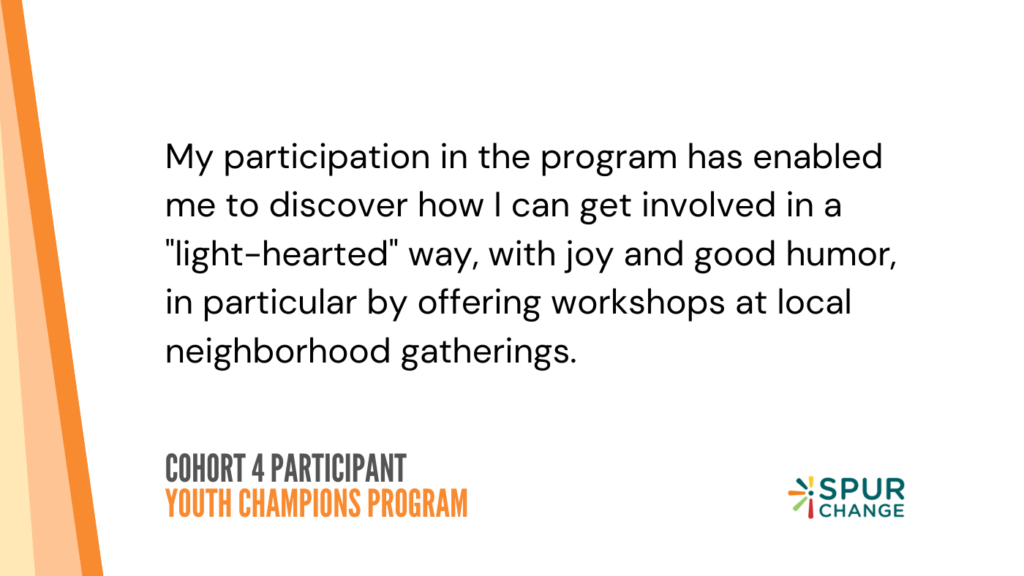
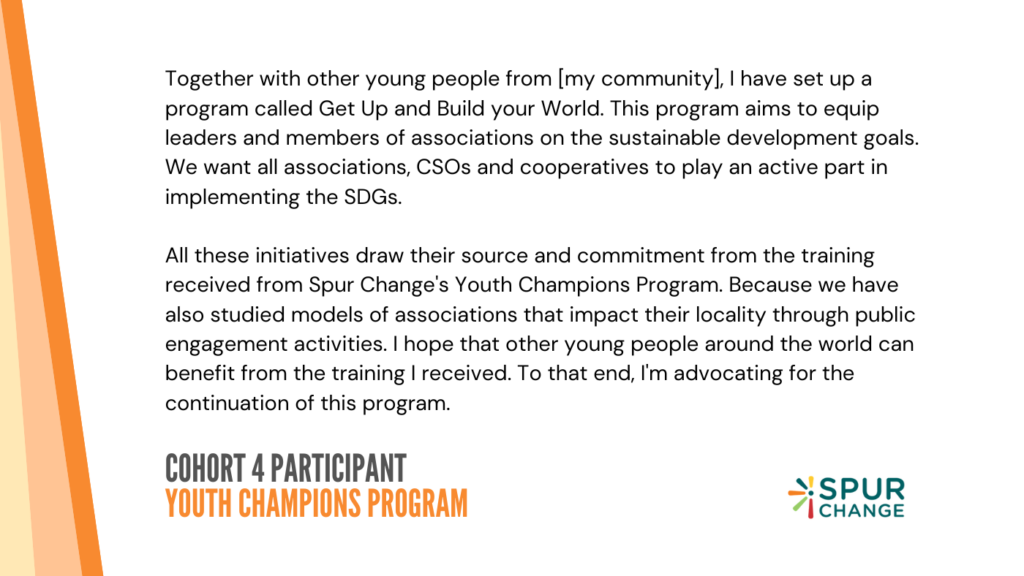
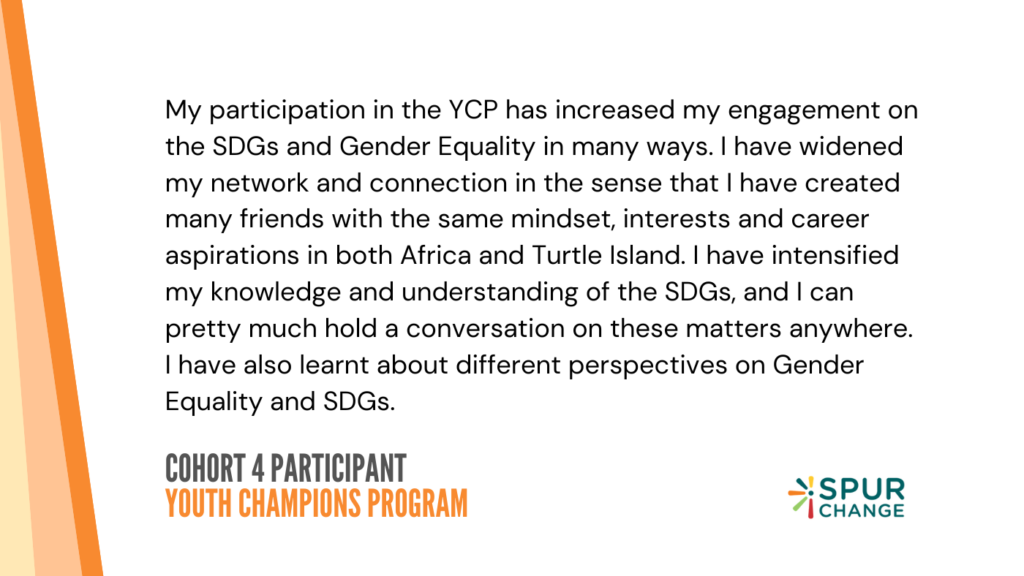
While the program has been fruitful and effective in previous years, valuable lessons were learned that enhanced this year’s activities. The major changes implemented included encouraging the pairing of Canadian and international youths to co-create public engagement activities, involving youth alumni in workshop facilitation, and organizing more peer-sharing opportunities throughout the program. These changes aimed to strengthen partnerships, foster international cooperation, and create a supportive learning community.
Improvement 1: Pairing of Canadian and international youth
One significant change implemented in the YCP this year was to pair Canadian and international youths to collaborate on a single project. This shift was designed to strengthen partnerships and reinforce international cooperation within their projects. By bringing together individuals from different backgrounds and locations, the pairings aimed to promote cross-cultural understanding and collaboration in addressing shared global challenges. The rationale behind this pairing process was to leverage the diversity of perspectives and expertise to enhance the quality and impact of the projects undertaken by the participants.
This strategy proved to be successful as all projects now include a strong international cooperation element. One unexpected outcome of this collaboration was the possibility of creating bilingual public engagement activities. Bringing together youth with diverse languages enabled them to develop activities in two languages and significantly expand their reach.

For example, André Diasivi Flam from the Democratic Republic of Congo and Harveen Saini from Alberta, were paired with the University of Alberta to do knowledge translation on the topic of Sexual and reproductive health (SRH). Together, they did extensive research of peer-reviewed articles on the topic to create a preliminary literature review from their notes. They used this new-found knowledge to write a concise one-pager that highlights the crucial role played by social media platforms in sharing essential SRH information. Their research encompassed numerous studies and sources, allowing for a comprehensive analysis of the subject matter. The one-page summary of their findings showcases the fact that social media platforms like Facebook, Instagram, YouTube, Snapchat, and TikTok play a significant role in influencing the lives of young people worldwide. Thanks to the bilingual partnership, they decided to make this one-pager available in both French and English in order to make the findings of their research more accessible and reach a larger audience.

Along the same lines, Frédéric Tindano from Burkina Faso and Pere Kennedy from Alberta have collaborated to create a groundbreaking magazine that addresses the omnipresent issues of gender equality and gender-based violence. This publication adopts a cross-cultural approach, seeking to foster a deep understanding of the multiple challenges faced by women and girls in diverse communities across the globe. Drawing on their research and knowledge, Pere and Frédéric have used Burkina Faso and Canada as case studies to discuss gender inequality issues that still exist across the globe. Their magazine is full of information, insights, and resources to empower readers to comprehend and confront these pressing issues.
Once again, thanks to their capacities and desire to share the results of their research to a world-wide audience, they have translated this magazine and ensured that it was available in both French and English.
Improvement 2: Workshops co-facilitated by ICN staff members and youth alumni
Another significant change implemented in the YCP this year was to incorporate the participation of youth alumni as facilitators in workshops. While the program had previously involved subject experts from the Inter-Council Network (ICN) and other organizations, this year saw the inclusion of youth from past cohorts as speakers. By inviting youth alumni to share their expertise and experiences, we aimed to create a larger sense of community among the youth participants of the program across the cohorts and provide the opportunity for alumni to share their successes and achievements post-YCP.
The inclusion of youth alumni as workshop facilitators exceeded the expected results and also fostered partnerships between the current cohort and alumni. Creating connections amongst current and past cohorts encouraged the current youth to feature interviews with past YCP participants and for others to build off the alumni’ social media platforms to increase their reach.

Jecinta Akoth Ochieng from Kenya, Priscilla Ojomu from Alberta, and Tinuola Olowojeunjeje from Manitoba worked together with Canada-Mathare Education Trust on a project called GreenGen. The project aimed to develop a comprehensive guidebook on environmental pollution and sustainability. The team employed several strategies to enhance the credibility, relatability, visual appeal, and impact of their digital guidebook. This included conducting interviews and surveys with experts, youth activists, and relevant stakeholders to gather valuable insights and diverse perspectives. Importantly, they also shared their own experiences and involvement in the field to establish a personal connection with readers, adding authenticity and encouraging active participation in environmental sustainability efforts. Canadian and Kenyan youth were invited to share artwork focused on the theme of environmental pollution and sustainability. To promote their project, they created a social media account on LinkedIn and Instagram.
As part of their process, they reached out to YCP alumni MJ Torres based in Ontario for an interview. MJ had co-facilitated a workshop on integrating youth perspectives into the international cooperation sector. This workshop created an opportunity for collaboration and led to MJ’s invitation. MJ’s involvement in the workshop allowed her to share her network of environmental activists and organizations, ultimately opening up this new collaboration opportunity with Jecinta, Priscilla, and Tinuola.

Lian Marie Sayno from Ontario also collaborated with MJ Torres for her public engagement activities. The YouthLEAF project was developed by Lian in collaboration with Centennial College. It aimed to shed light on the severity of food waste in Canada and its global impact; the target audience was Canadian youth as they are the future generation who will be responsible for shaping the way we approach food systems and waste management. Lian’s YouthLEAF project included an Instagram account with engaging visuals, informative infographics and a two minute video coupled with a social media challenge inviting people from across the world to share ways they reduce their food waste. Through the different components of her project, Lian hoped to create a sense of community and empower individuals to make a positive impact in their own lives and communities.
Interested by MJ’s perspective, Lian invited MJ to review and advise on her project. They also strengthened the relationship between their two Instagram accounts, YouthLEAF and StoriesChangingClimate, and collaborated on Lian’s project using both platforms to reach a wider audience. They hope to continue this partnership and their respective initiatives beyond the Youth Champions Program.
Improvement 3: Increasing peer-sharing moments throughout the process
Another important change this year was adding three additional peer-sharing opportunities throughout the program cycle. These informal peer-sharing chats provided an opportunity for youth participants and their partner organizations to discuss challenges, strategies, and progress in designing their public engagement activities. The intention behind these opportunities was to nurture a sense of belonging and mutual support within the program. These informal spaces proved to be beneficial and both youth and organizations participated actively in the exchanges.
One outcome from these peer-sharing opportunities was the establishment of a strong community of learning with collaboration amongst youth and SMOs taking place beyond these scheduled opportunities. A concrete example of this is the support that Brianna Long, VIDEA’s representative, provided to Harveen and André during their process. As a doctoral student, Brianna was aware of the complexity and the time-consuming process that is a literature review and she provided input both during and after the peer-sharing opportunities to Harveen and André to narrow the scope of their focus to ensure that it was realistic and achievable within the time constraints that they had to navigate. With her guidance, they learnt about the intricacies of a formal literature review and were able to shape it to their needs.
This collaboration could not have taken place without the peer sharing opportunities as Brianna was not originally Harveen and André’s mentor. The community of learning allowed for more dynamic and self-sustained knowledge sharing than in the past.
All in all, these three changes implemented to the Youth Champions Program this year resulted in a greater collaboration between Canadian and international youths, bilingual engagement activities, and an expanded reach; new partnerships and stronger sense of learning community.
More public engagement activities

Boubacar Ba from Sénégal, in partnership with Le Chœur des Altruistes hosted a round table where speakers from Montreal, Togo, and Senegal discussed how education can contribute to the sustainable development of local communities. In September, his virtual event was held with participants from across the globe present to discuss the place of education in sustainable development. When Boubacar noticed the forest fires in Canada, he was reminded of the devastating impact that similar fires have had in his home country of Senegal. As a result, he decided to write a summary comparing the effects of forest fires on local communities in both countries. This was done in addition to his original public engagement activity. In Senegal, forest fires have been a recurring issue, leading to severe ecological impacts including the destruction of forests, loss of plant and animal species, soil erosion, destruction of agricultural lands, and the water cycle. They have also had serious impacts on local livelihoods and wellbeing. By researching and summarizing the similar impact of forest fires in Senegal and Canada, Boubacar aimed to raise awareness and promote wildfire prevention, management, and global cooperation.

Julie Payet, an advocate of the “One Health” approach from Quebec, partnered with Montreal-based organization Katalizo to participate in two in-person community events. These events aimed to engage young people and the wider community in a deeper understanding of the textile industry’s impact on human, animal, and environmental health and to explore potential mitigation solutions. To further amplify her message, Julie took to Instagram with the handle “tout.est.dans.tout." Through this platform, they shared various strategies for individuals to make choices that prioritize not only human health but also the well-being of the planet and all living beings.

Kwikws Elizabeth Peters from British Columbia, in collaboration with VIDEA, has crafted a resource document that explores the transformative potential of climate-based storytelling and its role in fostering global citizenship engagement. Through a spirit of community, partnership, and resilience, both Kwikws and VIDEA managed to leverage existing materials and Kwikws’ expertise to create this resource, avoiding the need for additional research or virtual events.

Michael Songiso from Zambia, accompanied by VIDEA organized two storytelling events to invite Indigenous speakers (from Canada and Zambia) to share their knowledge of sustainable practices. These storytelling events served as a platform for Indigenous voices to be heard, encouraging dialogue and learning among attendees. By bringing together individuals from diverse backgrounds, these events fostered a sense of unity and understanding, cultural appreciation and sustainable practices through shared experiences. The expertise and unique perspectives of the Indigenous speakers enriched the events, further highlighting the importance of incorporating sustainable practices into all aspects of life, irrespective of geographical boundaries and cultural differences.

Nerissa Zhang, from Nova Scotia, and Suwadou Kah, from The Gambia, collaborated with the Nova Scotia Gambia Association to create an engaging podcast series. Motivated by their shared interest in mental health, the duo collaborated to invite influential speakers from diverse backgrounds, including perspectives from The Gambia, China, and Canada. Their goal was to offer a platform for these individuals to share their experiences and insights, and to foster a more comprehensive and intersectional understanding of women’s mental health issues on a global scale.
Recognizing the importance of reaching a wider audience, Zhang and Kah decided to amplify their impact by partnering with the ICN. They were able to leverage the organization’s established reach by hosting their podcast series on the ICN’s existing platforms. This strategic partnership not only ensured that their podcast would be easily accessible to a larger audience but also allowed them to tap into ICN’s network, further enriching the global perspectives and discussions on women’s mental health.
Looking back and ahead
Drawing inspiration from previous cohorts, the Youth Champions Program has continuously made significant improvements in collaboration, partnerships, and creating a sense of belonging. These accomplishments have played a crucial role in fostering international cooperation, nurturing a supportive learning community, and engaging the public in various ways. The success of the YCP as a pilot program has laid the foundation for implementing a proven formula, with the potential to engage more young Canadians on global issues.
As the program comes to a close, the Youth Champions from this cohort and previous ones will optimistically continue their engagement towards international cooperation efforts and the Sustainable Development Goals to expand the YCP legacy beyond its conclusion and inspire future young activists.
